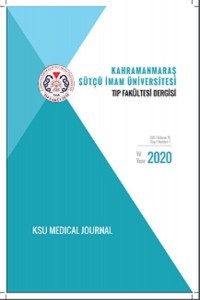Palyatif Bakımda Nörolojik Hastalıklarda Hemşirelerin Bilgisi Yeterlimi?
Palyatif bakım, Hemşireler, Playatif bakım bilgisi, Nöroloji
Do Nurses Have Enough Knowledge in Neurological Diseases in Palliative Care?
Palliative care, Nurses, Palliative care knowledge, Neurology,
___
- 1. Provinciali L, Carlini G, Tarquini D, Defanti CA, Veronese S, Pucci E. Need for palliative care for neurological diseases. Neurol Sci. 2016;37(10):1581-7.
- 2. Sanderson C, Tieman J. CareSearch-online palliative care information for GPs. Aust Family Physician. 2010;39:341-3.
- 3. Lorenzl S, Nübling G, Perrar KM, Voltz R. Palliative treatment of chronic neurologic disorders. Handb Clin Neurol. 2013;118:133-9.
- 4. Egan KA, Abbott P. Interdisciplinary team training- preparing new employees for the specialty of hospice and palliative care. J Hosp Palliat Nurs. 2002;4:161–71 5. Skår R. Knowledge use in nursing practice: The importance of practical understanding and personal involvement. Nurse Educ Today. 2010;30:132–6.
- 6. De Vlieger M, Gorchs N, Lankin PJ, Porschet F. Palliative nurse education towards a common language. Palliative Medicine.2004;18(5):401-3.
- 7. Chover-Sierra E, Martínez-Sabater A, Lapeña-Moñux YR. An instrument to measure nurse’ knowledge in palliative care: Validation of the Spanish version of Palliative Care Quiz For Nurses. PLoS One. 2017;18:12(5):e0177000.
- 8. Crossetti Mda G. Production of knowledge and the quality of nursing practice. Rev Gaucha Enferm. 2009;30:372–4.
- 9. Kwekkeboom KL, Vahl C, Eland J. Impact of a volunteer companion program on nursing students’ knowledge and concerns related to palliative care. J Palliat Med. 2006;9:90–9.
- 10. Kumar SP, Jim A, Sisodia V. Effects of palliative care training program on knowledge, attitudes, beliefs and experiences among student physiotherapists: A preliminary quasi-experimental study. Indian J Palliat Care. 2011;17:47–53.
- 11. Fabrigar L, Petty R, Smith S, Crites S. Understanding knowledge effects on attitude–behavior consistency: The role of relevance, complexity, and amount of knowledge. Journal of Personality and Social Psychology.2006;90(4):556–77.
- 12. Gruenewald DA, Higginson IJ, Vivat B, Edmonds P, Burman RE. Quality of life measures for the palliative care of people severely affected by multiple sclerosis: a systematic review. Mult Scler. 2004;10(6):690-704.
- 13. Jenkinson C, Fitzpatrick R. Reduced item set for the amyotrophic lateral sclerosis assessment questionnaire: development and validation of the ALSAQ-5. J Neurol Neurosurg Psychiatry. 2001;70(1):70-3
- 14. Gofton TE, Jog MS, Schulz V. A Palliative Approach to Neurological Care: A Literature Review. Canadian Journal of Neurological Sciences. 2009;36(03):296–302.
- 15. Magdalinou KN, Martin A, Kessel B. Prescribing medications in Parkinson's disease (PD) patients during acute admissions to a District General Hospital. Parkinsonism Relat Disord. 2007;13(8):539-40.
- 16. Chenoweth L, Sheriff J, Mc Anally L, Tait F. Impact of the Parkinson’s disease medication protocol program on nurses’ knowledge and management of Parkinson’s medicines in acute and aged care settings. Nurse Educ Today.2013;33(5):458-64.
- 17. Jarman B, Hurwitz B, Cook A, Bajekal M, Lee A. Effects of community based nurses specialising in Parkinson’s disease on health outcome and costs: randomized controlled trial. BMJ. 2002;4;324(7345):1072-5.
- 18. Farmani AH, Mirhafez SR, Kavosi A, Moghadam Pasha A, Jamali Nasab A, Mohammadi G, et al. Dataset on the nurses' knowledge, attitude and practice towards palliative care. Data Brief. 2018;(22):319-25. 19. Shipman C, Burt J, Ream E, Beynon T, Richardson A, Addington-Hall J. Improving district nurses’ confidence and knowledge inthe principles and practice of palliative care. J Adv Nurs. 2008;63(5):494-505.
- 20. Wilson O, Avalos G, Dowling M. Knowledge of palliative care and attitudes towards nursing the dying patient. Br J Nurs. 2016;25(11):600-5.
- 21. Proctor M, Grealish L, Coates M, Sears P. Nurses' knowledge of palliative care in the Australian Capital Territory. Int J Palliat Nurs. 2000;6(9):421-8.
- 22. Prem V, Karvannan H, Kumar SP, Karthikbabu S, Syed N, Sisodia V, et al. Study of Nurses’ Knowledge about Palliative Care: A Quantitative Cross-sectional Survey. Indian J Palliat Care. 2012; 18(2):122–7.
- ISSN: 1303-6610
- Yayın Aralığı: Yılda 3 Sayı
- Başlangıç: 2004
- Yayıncı: Kahramanmaraş Sütçü İmam Üniversitesi
Fibromiyalji Hastalarında D Vitamini Eksikliğinin Fiziksel Semptomlara Etkisinin İncelenmesi
İhsan KARABULUT, Deniz KOCAMAZ, Begümhan TURHAN
Kronik İdiyopatik Ürtikerde Vitamin D Düzeyi
Hülya NAZİK, Kamil MÜLAYİM, Perihan ÖZTÜRK, Mine KUŞ
Filiz ALKAN BAYLAN, Selim KARAKÜÇÜK
Fibroadenomların İçindeki ve Çevresindeki Histopatolojik Değişikliklerin Karşılaştırılması
İlke Evrim SEÇİNTİ, Didar GÜRSOY
Ratlarda Deneysel Olarak Oluşturulan Kolit Modelinde N-Asetil Sistein ve β-Glukanın Etkileri
Murat İSPİROĞLU, Bülent KANTARÇEKEN, Harun ÇIRALIK, Ertan BULBULOGLU
Feryal KARACA, Selahattin MENTEŞ, Timuçin ÇİL, Sıddık KESKİN
Palyatif Bakımda Nörolojik Hastalıklarda Hemşirelerin Bilgisi Yeterlimi?
Gülhan SARIÇAM, Kadriye KAHVECİ, Doğan AKDOĞAN
Okul Öncesi Dönem Down Sendromlu Çocuklarda D Vitamini Eksikliği
Raikan BÜYÜKAVCI, Mehmet Akif BÜYÜKAVCI
Mahmut YILMAZ, Mehmet BALLI, Mustafa GÜR
Myroides Odoratus/Odoratimimus’a Bağlı İdrar Yolu Enfeksiyonu: Olgu Sunumu
